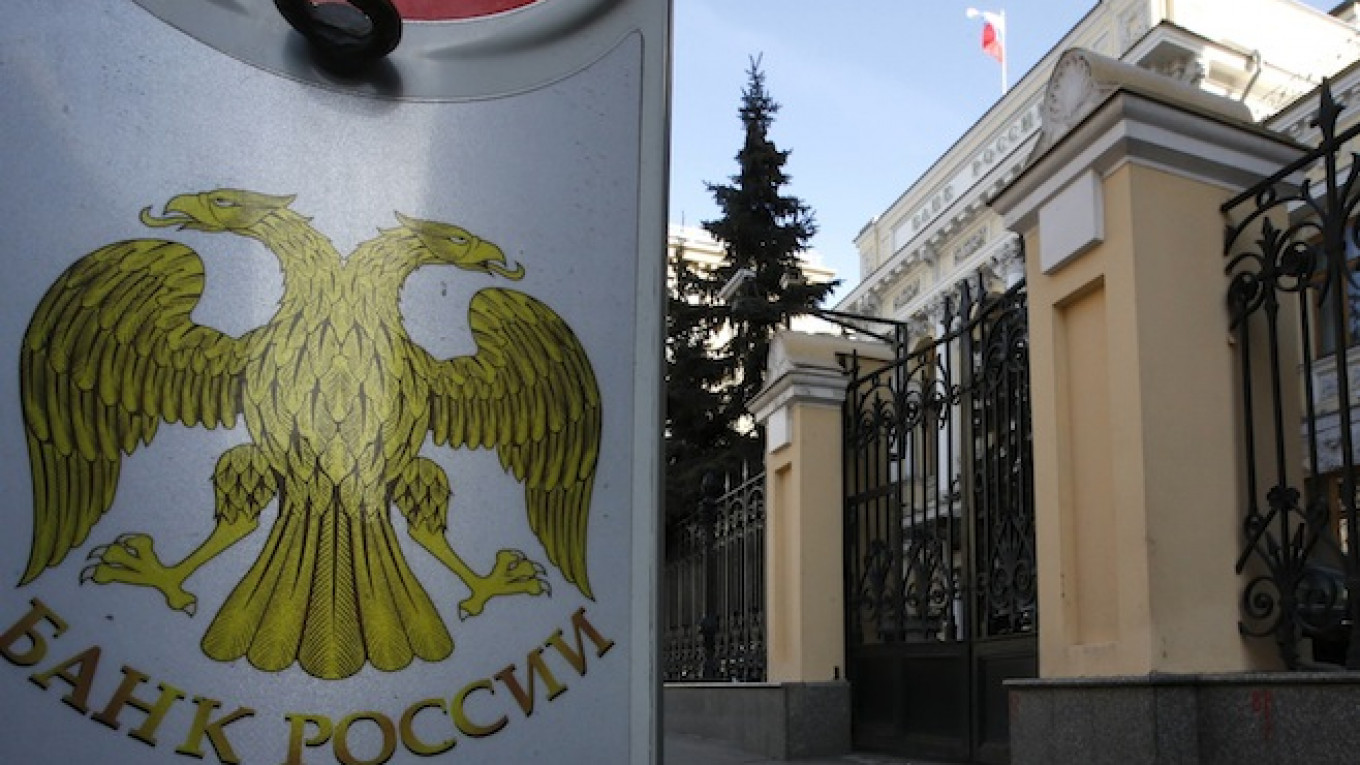The Russian Central Bank cut its main lending rate on Friday, sending a strong signal that it now sees the rapidly declining economy as a more serious worry than high inflation.
The bank reduced its one-week minimum auction repo rate by one percentage point to 14 percent, continuing an easing cycle that began in January when it unexpectedly cut the rate by two points.
This time economists had broadly expected Friday's move as the downturn gains pace due to the low international price of oil, Russia's main export, and Western sanctions imposed over Moscow's role in the Ukraine conflict. The ruble has stabilized since a panicky collapse late last year, giving the Central Bank breathing room to continue easing.
Data over the past few weeks showed that consumer spending, investment, real wages and gross domestic product are all sinking even faster than many had expected, indicating that the economy is heading into a steep recession.
Shortly before the Central Bank announcement, Russia's second-largest bank, VTB, reported almost zero profit for 2014 and said it would suffer "significant losses" if official interest rates were not cut.
The Central Bank made clear that it was now more concerned about this economic slump than inflation, even though consumer prices are now rising 16.7 percent year-on-year, the highest level for 13 years.
"The balance of risks is still shifted toward a more significant cooling of the economy," it said in an accompanying statement, adding that the rate cut would help to mitigate these risks without creating the threat of stronger inflation.
"An attempt to lower inflation at any cost would be a short-sighted strategy," Central Bank Governor Elvira Nabiullina told a news conference. This comment marked a shift from her previous insistence that inflation should be on a clear downward trend before rates would be cut.
"It is obvious that the task of supporting the economy now prevails," said Raiffeisenbank economist Maria Pomelnikova. "In the Central Bank's eyes, inflation risks have now receded into the background."
Multi-Year Recession
The bank predicted that gross domestic product would contract 3.5-4 percent this year, a more pessimistic view than the government's official forecast of a 3 percent decline, but still more optimistic than many analysts' projections.Nabiullina said the bank also expects the economy to continue contracting, by 1-1.6 percent, in 2016. It expects a strong rebound only in 2017, when growth could exceed 6 percent, she added.
The refocusing of the bank's priorities may fuel speculation that recent changes in its management have played a role, with new monetary policy head Dmitry Tulin regarded as more dovish than his predecessor Ksenia Yudayeva.
It may also reinforce the impression that the bank is under pressure to ease up from the Kremlin and business lobbies, although the bank says it is independent. "This looks like the result of political pressure," Danske Bank economist Vladimir Miklashevsky said.
The cuts in borrowing costs contrast to last year, when the bank raised rates six times, including a dramatic 6.5 point increase at an emergency meeting in mid-December aimed at stemming a run on the ruble.
The ruble has lately been showing much greater stability, implying that ordinary depositors are no longer rushing to convert savings into dollars.
William Jackson, emerging markets economist at Capital Economics in London, noted that crude prices have pulled back from their lows in January.
"In practice the Central Bank is reacting to the ruble stabilizing due to the rebound in oil prices. As long as the ruble remains stable, then we expect the bank to continue lowering rates," he said.
The ruble strengthened after the decision, as the rate cut was smaller than some analysts had expected.
At the end of Friday, the ruble had weakened 1.6 percent to 62.2 against the dollar, having risen earlier in the day following news of the cut.
In a notable contrast to last year's rhetoric, the Central Bank sounded relatively relaxed about inflation, saying the current high rate was due to short-term factors which would lose their effect by the end of 2015.
It predicted inflation would fall to around 9 percent in a year's time and was still on track to reach the bank's medium-term goal of 4 percent in 2017.
Nabiullina later said the bank expected inflation to end this year at 12-14 percent and "closer to 12 percent."
But the bank said that high inflationary expectations remained a risk, as well as budget loosening, a possible acceleration of nominal wage increases and possible increases in state-regulated utility price.
The bank signaled that the easing cycle would continue, but has left analysts guessing over the speed of future cuts.
"Depending on the reduction of the indicated risks the Bank of Russia will be ready to continue lowering the key rate," the bank said.
A Message from The Moscow Times:
Dear readers,
We are facing unprecedented challenges. Russia's Prosecutor General's Office has designated The Moscow Times as an "undesirable" organization, criminalizing our work and putting our staff at risk of prosecution. This follows our earlier unjust labeling as a "foreign agent."
These actions are direct attempts to silence independent journalism in Russia. The authorities claim our work "discredits the decisions of the Russian leadership." We see things differently: we strive to provide accurate, unbiased reporting on Russia.
We, the journalists of The Moscow Times, refuse to be silenced. But to continue our work, we need your help.
Your support, no matter how small, makes a world of difference. If you can, please support us monthly starting from just $2. It's quick to set up, and every contribution makes a significant impact.
By supporting The Moscow Times, you're defending open, independent journalism in the face of repression. Thank you for standing with us.
Remind me later.


